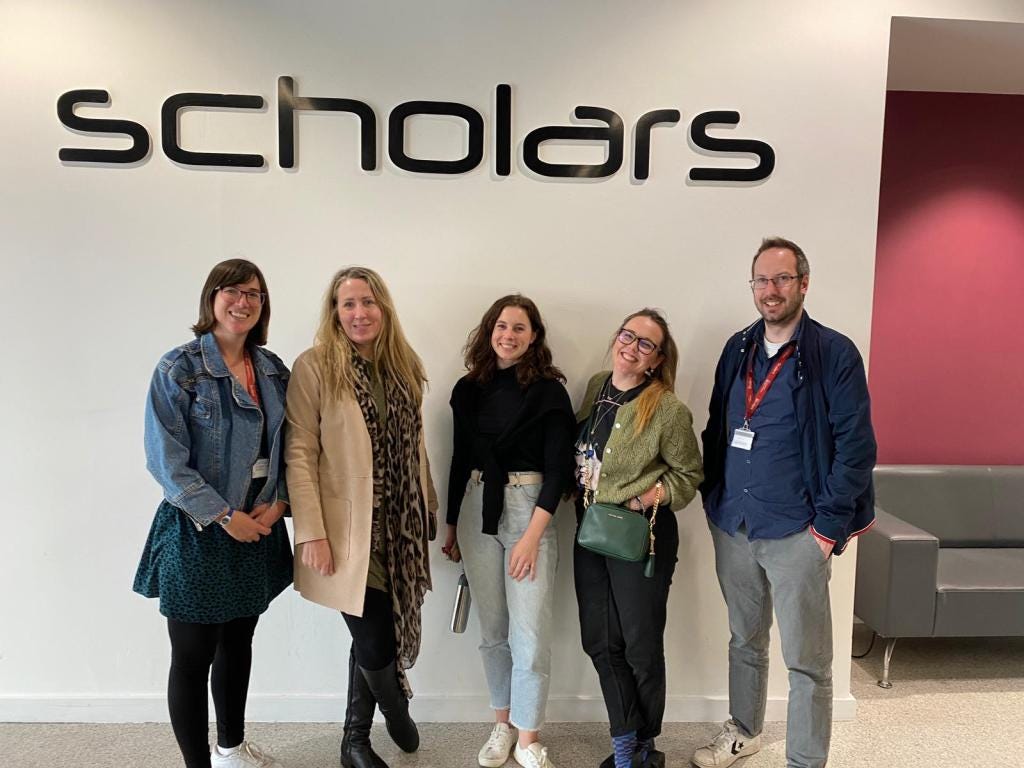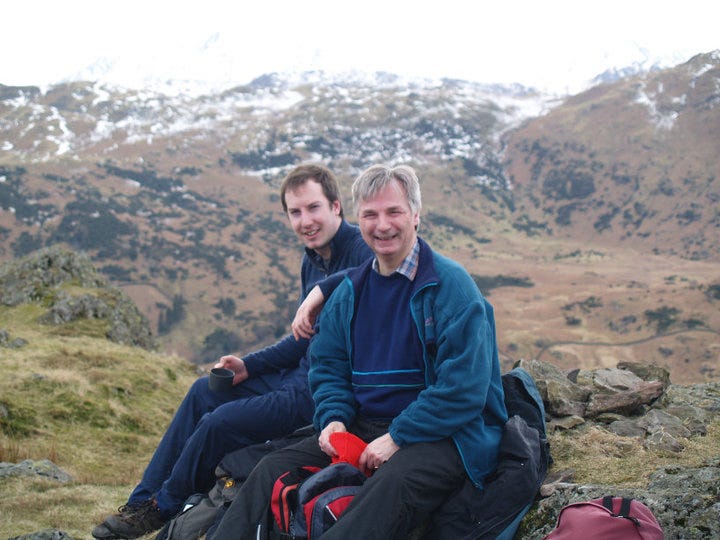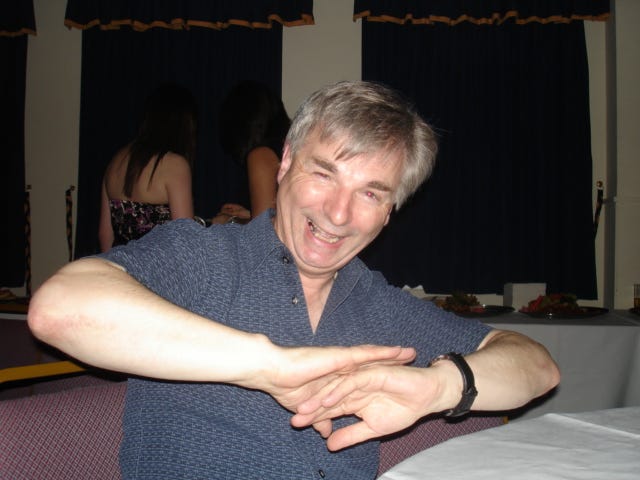What my Dad taught me about being an editor
Tomorrow (24 May) my Dad would have been 70.
He died in 2020 after a short battle with pancreatic cancer. That still hurts to write and say, but does get easier with time and the more often you say it.
This week I'm on a journalism leadership course at the University of Central Lancashire in Preston.

My Dad would love that I'm on it, and getting the opportunity to work with and hear from a whole range of editors and industry speakers from across the globe. My Dad was always curious. And supportive.
One of the things we reflect on during the course is the role of journalism, and more specifically the editor.
I've had this post in my head for a while and it feels a fitting time to write it, on the eve of what should have been a huge celebration for the old man (who would have asked "for a lie down in a dark room" when asked what he wanted for his birthday, without fail, for the past decade or so this was his stock response!).
My Dad wasn't an editor. He wasn't a journalist. So what could I draw from his character that translates across to an editor?
Using your position for good
An editor is in a unique position to be able to shine a spotlight on people, causes and more. My Dad was always inspiring to me about the work he did to raise money for charities - by deploying his charity wine tastings while working at Tesco and then later while self-employed. He didn't have to do them, but he felt it was important and he enjoyed doing them.
He taught me the value in helping others and how even small sums of money can make a big difference. Yes we need to drive audiences, hold politicians to account, support commercial initiatives (the list is endless for an editor in terms of roles to play!) but what's that thing you're doing to make a difference? I didn't realise this early enough in my career - we as journalists, and editors, have the ability to do an awful lot of good and I always try to ensure I've got something on the go that is making a difference. My Dad would hold my feet to the fire on this, and always applaud when I'd done something that helped others - more so than if I'd got a big story or a promotion. I miss him not being around to do that.
You'll need an awful lot of resilience
Journalism is an industry always in flux. Even more so when digital came along. Add in pandemics, inflation, wars, social media giants, regulation changes and more. Plus the natural unpredictability of news. There is a high chance we'll find ourselves in difficult positions throughout our careers as editors. We have to learn to be able to handle, and utilise, change to our advantage. And embrace it.
Keep going and keep showing up was my Dad's advice when things were tough. He spoke from experience, made redundant twice in his career, he picked himself up off the floor each time and kept going. And reinvented himself, first as a wine adviser with Tesco (after a fairly long career as a typographer) and then going self-employed after working for a wine agency. This is a short section from my father's eulogy that I read at his funeral:
I have tremendous respect for how my father managed this time in his life. To keep a roof over your family’s head, in the face of being out of work, and yet coming out of that period with a job that was about your hobby, that became a career, is incredible, and resilience is another of our father’s greatest traits.
And when you're under the cosh, don't forget to treat people decently.
Mr Network
If my Dad was a journalist, he'd be the one with the bulging contacts book. He collected business cards (when they were a thing), phone numbers, addresses. He knew everyone, and could tell you something significant about them too.
My first full-time journalism role was at Media Wales in Cardiff, working for WalesOnline. I remember phoning my Dad to tell him. He was chuffed, and then followed up with, "and say hello to Cammies for me." Confusion followed from me. "He works there, know him from a wine show." Of course, my first day, I sat down, and opposite me was page designer Neil Cammies. "Ah, you're Peter's son" he said and we chatted away about my Dad and wine shows they had met at. What are the chances eh?
Another extract here from the eulogy, but it sums it up well...
Our Mum puts it best, she described our Dad as a ‘collector of people’. You could talk to Dad about anything, and he would definitely talk to you about anything!
I always try to make time to go to things, to meet people, to hear what people are up to. And I see lots of editors doing the same - they are the ones in the know, because they have that network.
Don't be scared of trying new technology
When Dad was made redundant from his typography career it was because of technological advances. They had brought in design and print software - QuarkXPress - and Dad was there drawing stuff with pen. Sadly there was only thing going to happen and combined with the economic situation in that period of the 90s there was no retraining offered. With two kids, having just bought a house, and another child on the horizon, then Dad was out of work.
Instead of becoming a technophobe, or resenting technology, he embraced it. He bought a very early Apple Mac. He became a life-long Apple fanboy - still subscribing to Macworld magazine! Dad was on Twitter - I discovered after he died that he had set up an alert so whenever I tweeted anything it came through to his iPad. This also explained how he would sometimes message me and go 'How's the Newcastle newsroom son?' despite me not saying where I was that week...
Dad undertook training sessions on Quark, and then self-taught himself with those giant manuals before the days of just watching YouTube how-tos. He would do layout and design for charity and community newsletters, and plenty of other things too.
Spotify, YouTube, Instagram, LinkedIn, you name it - he was giving it a go. If he was still here, I'm sure he'd be on TikTok much to my five-year-old daughter's amusement and all of our embarrassment!
He passed this interest in technology, and new ways of doing things, onto me I think. I can remember him teaching me how to layout things in QuarkXPress - I must of been age 10/11 - something like that - and I think it's probably that which helped spark my interest in media and journalism. As I can remember him explaining that was how newspapers, and then websites, were designed and laid out and all these words filled them and the journalists wrote the words.
So, try out the new thing, give it a go, figure it out, ask someone who knows about it to teach you. Be cynical, of course, but also look for how the opportunity is there to reach an audience and tell stories in a different way using something new. And understand what it is, so when people are asked to do things, there's a basic understanding of what's feasible with whatever the new way of doing things might be.
Attention to detail
One of the analogue skills my Dad retained was calligraphy. His attention to detail with it was superb. He loved fonts, and type, and all of that. He'd get the pens out, covering the dining room table (no doubt driving my Mum nuts in the process) and then zone in on writing out place-settings for a wedding or an event. My handwriting is terrible, so he didn't pass any of that skill onto me, but his ability to focus and deliver that detail is something that as an editor you need.
Adding that extra emphasis to something, remembering that sequence of events, what something used to be, who connects to who. It's those little details that often make the difference and can turn a newsroom onto a story when all looks lost in it coming off.
And for being an editor locally, my Dad always had this great sense of place, he could tell you what that shop used to be called. Driving round Southport where he grew up you would always have to brace yourself for 'and this was x place' and then became 'y place'. And of course, "I remember when all this were fields....".
So yes, I reckon my Dad would have been a good editor. He was lots of other things too, as well as the above.
I miss him. A lot. I really miss him in a work context too. He never really got the process of journalism, but he knew it was important. He knew what we did mattered. And he knew it had the ability to do a lot of good, for an awful lot of people, and he also understood that it didn't stand still.
So just like with my Dad, there was always another story waiting to be told.
I'll raise a glass to him. 70 eh? Good innings, as he always used to say.
Night Dad. Miss you. And thanks for everything you did for us all.






